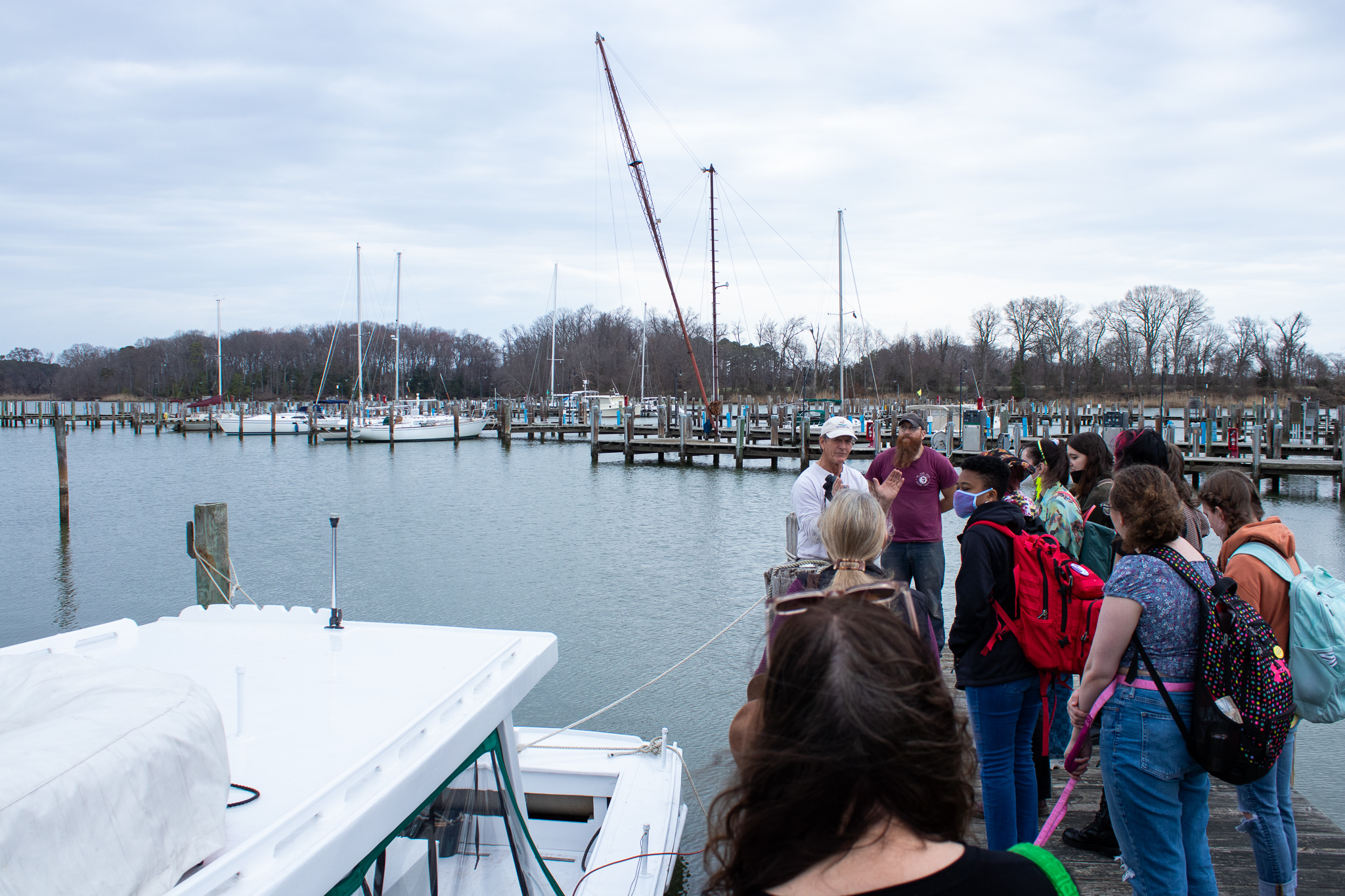River Schooling
Ecopoetry Students Find Inspiration in New Environments

On a warm day in early March, Washington College's Ecopoetry class gathered on an old dock on Davis Creek, site of a once-booming-now-disappeared seafood town called McKinleyville. They have just spotted the first osprey of the season, returned from its winter home in the south to reclaim a shaggy nest on a piling.
“The last of the geese left this morning,” Captain Andrew McCown of Echo Hill Outdoor School explains. He has been watching the full moon, wind direction, and how the fields of feeding geese were holding their heads, to calculate this timing: spring has arrived. And he has invited students to celebrate with poetry and music and a seasonal feast of fried perch roe.
The class is taught by Meredith Davies Hadaway, an award-winning poet whose three books of poems feature the seamless connection between the landscape of the Eastern Shore and the lives—human and otherwise—that depend upon it. Hadaway retired from her administrative post at Washington College in 2014 but returned to serve as Sophie Kerr Writer-in-Residence for the spring semester, teaching two poetry courses including this ecopoetry workshop. The course focuses on both critical and creative writing at the intersection of environmental issues and the arts.
“What better laboratory, what better muse, than our own Chesapeake Bay and its tributaries?” she asks. The indoor meeting site for this group is nearly as scenic: the Semans-Griswold riverfront classroom features glass walls surrounded by marshgrass with the Chester River shimmering everywhere. There, the students read Wendell Berry, W.S. Merwin, and Mary Oliver, alongside the work they share with each other, poems based on prompts, places, and field experiences.
Alaina Perdon, a senior from Forked River, NJ found the recent field trip inspiring. “Between hearing the poems and songs and sharing some classically Eastern Shore experiences — eating fried white perch, watching an osprey circle the river, and listening to the clang of old workboats against the docks — I felt inspired to create more, but also to foster a closer relationship with my surroundings,” she said. Perdon, who is majoring in Environmental Studies, felt it especially important that the trip wasn't about “how to write”, rather it was an exercise in paying attention, which helped with her own creative process. “I definitely penned a few river-themed poems after returning!”
Another Ecopoetry student, Brennan Keifer, echoes that sentiment, noting that “being out in a new environment helped to engage me more in the lesson in a way that wouldn't have happened from a classroom chair.” Keifer, a senior and an English major, also feels that what makes the entire class different is the emphasis on place. “In EcoPoetry, we are constantly aware of where we are and many of the poems we read or write connect back to our surroundings. That's really one of my favorite things about the course – it makes me feel involved in the local community as well as the greater Eastern Shore community in a way I've never felt before.”
In addition to a final portfolio, students will each present an eco-project, applying the vision that informs their reading and writing to some other passion in their lives: i.e. dance, photography, drama, rowing. “What I hope we have learned in our semester together, “says Hadaway, “is that poetry doesn't just happen on the page.”
As the last batch of fried perch has disappeared, the students take seats alongside the wooden hull of the “Twilight,”—an historic boat that the Echo Hill crew is restoring plank by plank—for a program of local music and poetry. Between each song, there are poems of the river and bay, the marshes, and farmlands, written by generations of those who plied the waters and plowed the fields. And on this day, Washington College students who have brought their own poetry to share, adding their voices to a long and continuing conversation.